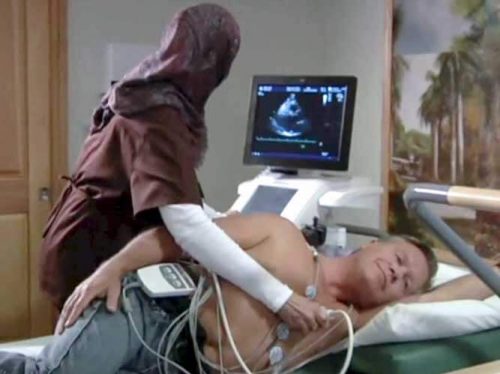What is an Stress Echocardiogram?
- Time: approximately 60 - 75 minutes

Why is it done?
Your doctor might request an stress echocardiogram to:
- See how well your heart tolerates activity
- Evaluate the function of your heart and values
- Diagnosis or monitor coronary artery disease
- Determine the effectiveness of your cardiac treatment plan
- Identify or monitor blockages or reduced blood flow
- Monitor the success of a heart surgery and determine how much exercise you can safely tolerate during rehabilitation
How do I prepare?
There are a few things you should and shouldn’t do prior to your appointment:
How do I get ready for the test?
- Avoid caffeine on the morning of your test (including tea, soft drinks, chocolate, decaffeinated products, etc).
- Eat a light meal only.
- Do not drink alcohol.
- Do not smoke.
- Do not apply lotion or cream to the chest area.
Should I take my medications?
- Take all of your regular medications at their usual times. Do not stop taking any medication unless directed by your doctor.
- If you are diabetic and use insulin: Take half of your normal insulin dose on the day of your test. The exercise may lower your blood sugar levels. If you have any concerns or questions, please call the clinic or consult your family physician.
What should I bring with me?
- Your health card
- Bring all of your current medications in their original bottles.
What should I wear?
What happens during the test?
A stress echocardiogram is performed by a certified technician.
- You’ll be asked to remove clothing from the waist up and be given a gown to wear.
- You’ll be instructed to lie down on an examination table on your left side.
- Several small electrode stickers (sensors) will be attached to your chest. These will be connected to a machine that monitors your heart beat during the test (ECG).
- The sonographer spreads gel on the small probe (transducer).
The transducer is pressed against your chest to record the sound wave echoes from your heart. A computer converts these echoes into moving images on a screen. - You’ll then exercise on a treadmill, starting slowly and gradually increasing intensity.
- You’ll continue to exercise until you reach your target heart rate (varies depending on your age & fitness level) – Approx 10 to 15 minutes.
- Once, you’ve reached your target heart rate, you’ll get off the treadmill and return to the exam table for another echocardiogram.
Frequently Asked Questions
Can I eat before the test?
Yes, eat a light meal only. Avoid eating a large or heavy meal as it may make you uncomfortable during treadmill portion of the test. Avoid caffeine on the morning of your test.
Should I take my medications the day of ?
What should I wear for my test?
Wear a comfortable two-piece outfit. You’ll be asked to remove clothing from the waist up and be given a gown to wear. Please do not apply any lotions, creams or powders to your chest area.
Does it hurt?
It’s normal to feel an increase in your heart rate and breathing during the test. This is especially common if you’re not used to exercising. You may also feel slightly tired or unsteady when you get off the treadmill.
How/When do I get my results?
Your test results will be sent to the referring physician and your family doctor. If a consultation has been requested, we will set up an appointment for you to speak to a cardiologist to discuss the results with you.
Are there any risks or side effects?
The main risks of a stress echo are due to any underlying heart condition. By stressing your heart, you may experience symptoms such as an arrhythmia or chest pain/pressure. You’ll be monitored carefully during the test and it will be stopped immediately if there are signs of any problems.
